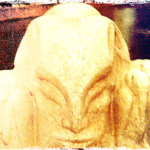Dialectic Two-Step – Buddhism and Easter?
 Dialectic Two-Step is an ongoing series of my thoughts on questions that come my way.
Dialectic Two-Step is an ongoing series of my thoughts on questions that come my way.
Wisdom lies neither in fixity nor in change, but in the dialectic between the two. - Octavio Paz
Buddhism and Easter?What’s a western Buddhist to think about Easter? My religious trajectory started in Christianity, shifted by default into varying degrees of agnosticism and atheism, and then settled on Buddhism. So you can probably surmise where I lie on the question of the resurrection of Christ. It was a deal breaker for me.
I’ve offered and you’ve probably heard the euphemisms provided by Buddhists, Pagans, Agnostics, and Atheists. We acknowledge a shared understanding of the holiday whilst avoiding confrontation on the issue of the plausibility of resurrection.
I feel we can all agree on the meaning of these events within the framework of mythology. All religious traditions carry with them lessons rife with the supernatural. The Buddha is said to have been born from his mother’s side. Upon birth, he was said to have taken 10 steps and proclaimed “I am the world honored one.” He spoke with the Gods and instructed demons. Pagans come from a tradition filled with immortals, magicians, and the like. Even famous agnostics and atheists use the language of God. Einstein famously said that “God does not play dice.” But we have vastly different interpretations of what these stories mean.
I believe that the framework of mythology is the most conducive way to talk about religious beliefs in a plural society. Not so much to avoid confrontation; that is self censorship, but to suspend the reactionary explosions that fall out of questioning core religious tenets. All religious and non religious people acknowledge an innate human thirst for knowledge. At the center of this hunger is the desire to know who we are and our relationship with the world. Science and religion are both avenues to explore these questions. Where these two approaches are in conflict, we have to ask why.
Science and religion have constraints and advantages which put boundaries on their effectiveness. Science is constrained to answering questions that can be tested. Religion is constrained by its history, doctrine, and structure. Science can’t answer questions about God. Religion has a difficult time correcting itself in the face of evidence contrary to dogma. Science offers a flexible, self correcting mechanism for advancing knowledge. Religion offers a moral perspective on how to view the progress of science.
On the topic of Easter, the rebirth of life in spring is a blessing that the heart rejoices. I see the resurrection of Christ in this context and deeply appreciate hearing Handel’s Messiah with this in mind. We can and should put aside our theological differences to join the age old chorus celebrating the spring blossom. In this we share with our ancestors the taste of the mystery that drives us to seek. But when we rejoin the conversation of how religion and science should be engaged in structuring our society, we should speak plainly and honestly on the facts.
Happy Easter!
Get Each Week's Dialectic Two Step in your email boxFirst Name:
Last Name:
Email address:
In addition to a monthly email you can also subscribe to the following weekly series:
One Minute Meditations
Tiny Drops (Photography series)
Compass Songs (My Favorite Poems)
Dialectic Two-Step
Modern Koans (interesting questions)
Sunday Morning Coming Down (Music Videos)
Relics (Timeless Republished Articles)
Say What?
Quotes
Verse Us (Poems I Write)
The post Dialectic Two-Step – Buddhism and Easter? appeared on Andrew Furst.



